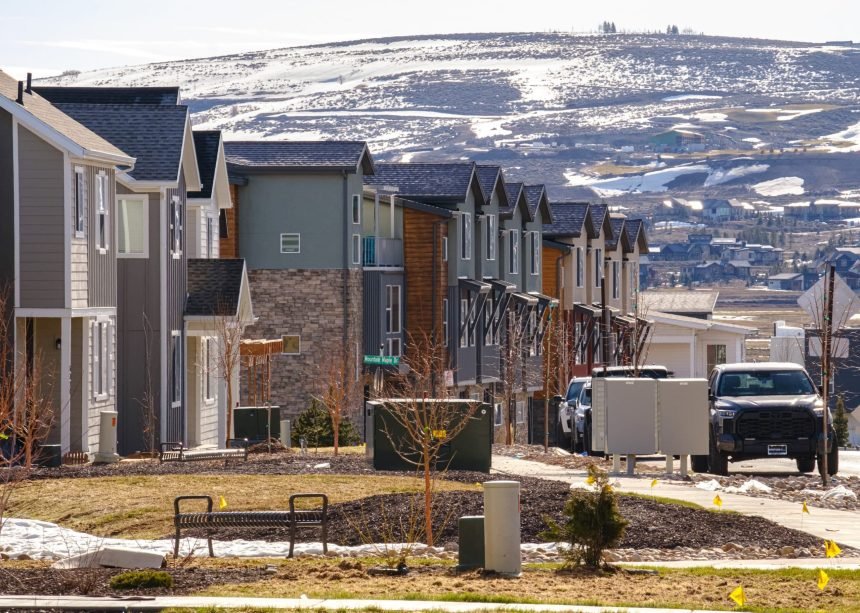As Park City prepares for another ski season, the Workforce Employer Rental Incentive Program is entering its third year, with applications now open for local landlords who want to participate.
The program, known as WE RIP, aims to help employees of any Park City Chamber/Bureau member business secure affordable local housing. The initiative, developed by the Mountainlands Community Housing Trust in collaboration with the Chamber/Bureau, offers incentives to landlords who rent to seasonal and year-round workers — a group that plays a central role in the town’s visitor economy.
“It started as a simple idea,” said Scott House, the vice president of partner services at the Chamber/Bureau. “Seasonal workers are the backbone of our visitor economy. They bring energy, dedication and heart to this community, and WE RIP is one way we can give back, supporting housing, rewarding their contributions and fostering a truly ‘Mountainkind’ community where everyone thrives.”
Housing has become increasingly scarce for the workforce that supports Park City’s tourism economy. A shortage of affordable options has pushed many employees to seek housing in neighboring counties.
Park City’s closeness to Salt Lake City provides access to a wider labor pool, but it also means many workers face long daily commutes from Salt Lake or Wasatch counties, contributing to congestion and increasing pressure on both workers and local infrastructure.
For the Chamber/Bureau and Mountainlands, programs like WE RIP are one way to reduce that pressure by opening up more in-town housing options for those who staff local businesses both seasonally and year-round.
The program began three years ago under the leadership of former Mountainlands housing advocate Megan McKenna, who now serves on the Summit County Council. Its first version launched in partnership with Deer Valley Resort, limited to resort employees, before expanding citywide in its second year.
“When Megan first reached out, she had this great concept,” House said. “Other ski towns like Sun Valley and Vail had tried something similar, but they offered cash incentives that cost tens of thousands of dollars a year and didn’t necessarily attract more landlords. We wanted to approach it in a way that reflected Park City’s character.”
Rather than providing cash, the Chamber/Bureau and Mountainlands sought an approach that spoke to Park City’s character — a place defined by its mountains, outdoor spirit and close-knit community, said House.
Rossignol, the global ski brand headquartered in Park City, became the first partner by offering discounted ski equipment that the Chamber/Bureau helped subsidize for participating landlords.
The approach worked and the program grew steadily over its next two years. This season, WE RIP again features incentives from Rossignol along with new options from JANS/Fishwest.
Landlords who rent to local employees through Mountainlands can choose from Rossignol alpine skis and bindings, a fly-fishing rod and reel package from JANS/Fishwest or a $300 Mountainkind Card, a digital gift card usable at more than 100 local businesses.
“The goal is to keep it flexible and appealing,” House said. “If someone already has their ski gear, maybe they’d rather have a fly-fishing setup or a card they can use around town. It helps us reach a wider range of landlords.”
Last winter, WE RIP helped secure 13 listings totaling 22 rooms and 36 beds. The target for this year is 15 to 20 units, offering 40 to 50 beds.
“We’re not trying to double the size overnight,” House said. “We want to see steady, manageable growth. Small gains each year are what make the program sustainable.”
Because WE RIP operates on a limited budget and relies on community partnerships to fund incentives, it isn’t designed to meet the full scale of Park City’s housing demand. Instead, it is focusing on achievable progress — adding a few more landlords and beds each season while maintaining the resources to support them effectively.
Mountainlands Executive Director Jason Glidden said many of those participants include both first-time landlords and homeowners who previously rented short-term but switched to the program because of its simplicity and incentives.
“We have seen both new landlords who have offered up their extra bedroom that has gone unused in the past, as well as landlords that have rented short-term in the past but choose to switch to our program because it is easy and the incentives were worth it,” he said.
Glidden said there is room for the program to grow by involving more community partners and expanding the types of incentives offered.
“I think that it has always been our goal to have as much of the community participate in the program. That includes local businesses,” he said.
He explained that each new sponsor, whether a gear shop, restaurant or service provider, helps attract additional landlords and, in turn, keeps more of the workforce living locally.
“The more businesses that participate by providing incentives, the more community members will participate in providing housing,” said Glidden. “That means more of the workforce living locally and helping keep these businesses running smoothly throughout the year.”
Glidden said each new business that gets involved adds momentum to the effort and helps create housing opportunities that can last beyond a single season. It’s a gradual effort that House said mirrors a Park City approach to solving challenges — through collaboration and persistence.
“We know we’re not making these huge impacts. We’re not pulling 300 units out of the ground tomorrow for workforce housing. But we do believe that by making these small steps and engaging our community and doing it in a uniquely Park City way, it is something that is really special, and we’re just proud to be a part of it,” said House.
Thus, while the resorts are major employers of seasonal workers in the area, Park City Mountain and Deer Valley Resort have refrained from partnering with and using WE RIP to reserve the program’s capacity for smaller employers.
“Resorts like Deer Valley and Park City Mountain have incredible resources and strong housing programs of their own,” House said. “They’ve told us, ‘We’re in a good place — let’s make sure this program supports the smaller businesses that really need it.’”
Through WE RIP, the Chamber/Bureau and Mountainlands aim to bridge a growing gap that leaves many essential workers priced out of the community they serve. For House, making it possible for those employees to live in Park City is crucial to preserving both the town’s economy and its cultural character.
“Park City runs on a diverse workforce,” House said. “People work multiple jobs just for the opportunity to live here. Anything that makes that more attainable is worth pursuing.”
Landlord applications are open through Nov. 15, just ahead of the winter season when incentives like new ski gear are still in stock and easiest to secure. Listings are posted at housinghelp.org, where eligible employees can apply as openings appear.











